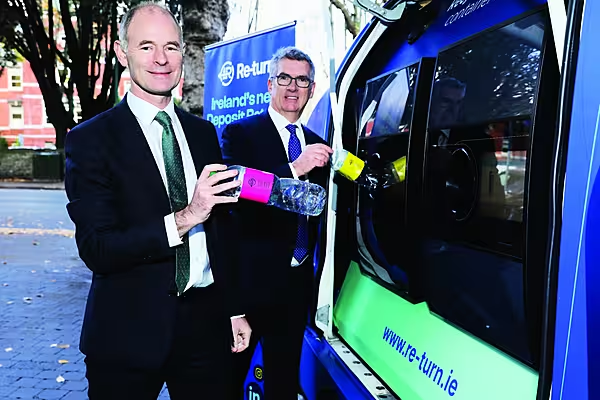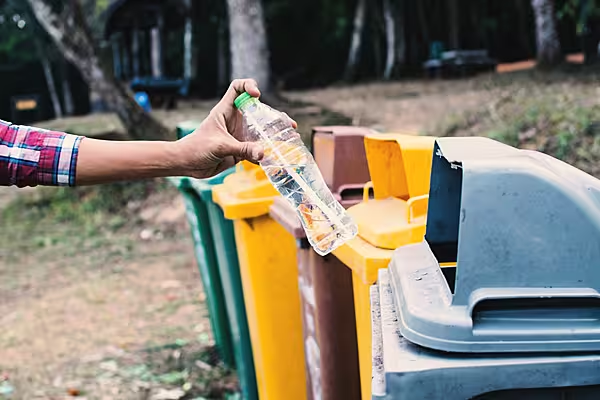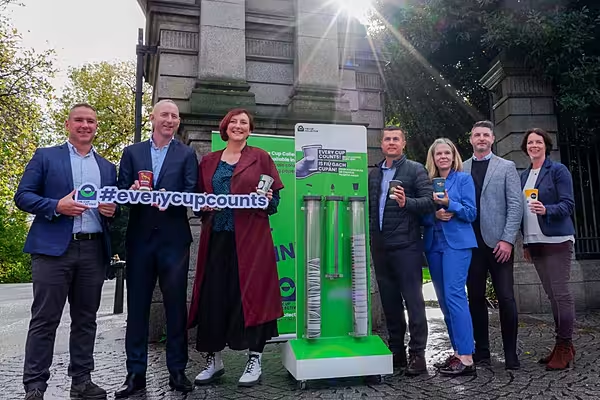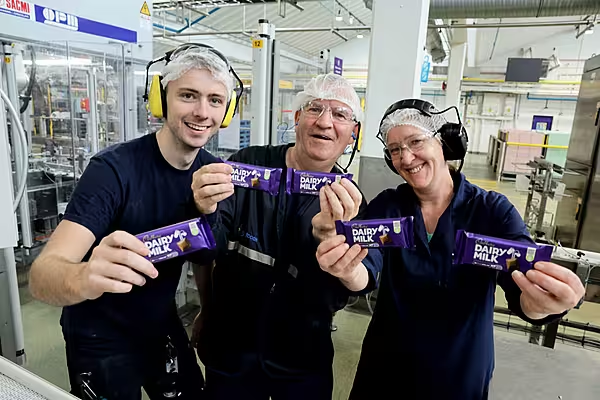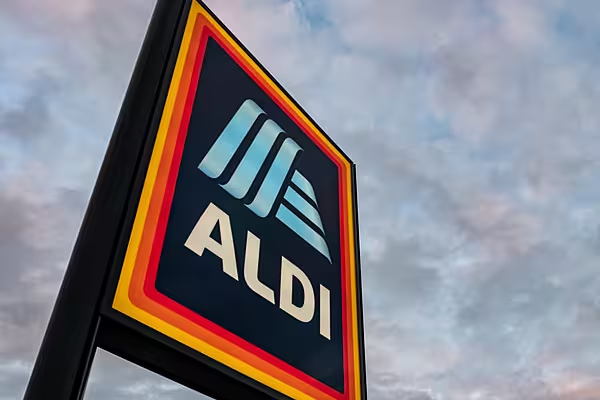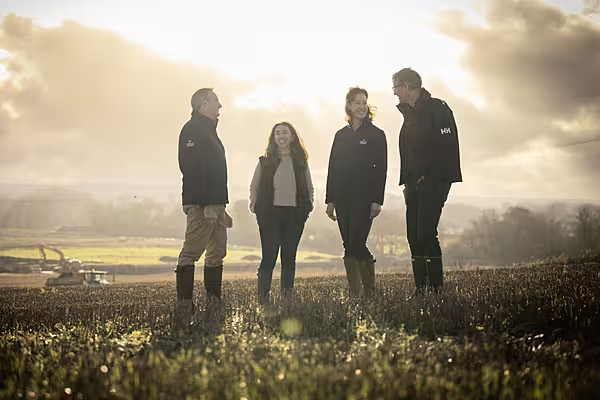On 14 December, Maev Martin spoke to Ossian Smyth, Minister of State with responsibility for Communications and the Circular Economy, about the impact on retailers, producers and consumers of Ireland’s Deposit Return Scheme, which will go live in this country on 1 February 2024.
Under the Single Use Plastics Directive, Ireland must ensure the separate collection of 77% of plastic beverage bottles placed on the market by 2025, rising to 90% by 2030.
“We are at 55% at the moment, but we won’t be on course to achieve those targets unless we recycle more bottles and cans than are currently being recycled,” says the Minister.
“When it comes to the targets for aluminium cans, we must have 50% of those recycled by 2025 and 60% by 2030. While these targets are mandatory, we don’t have to operate a Deposit Return Scheme in order to achieve them. However, we have opted to introduce it as we believe it is the best way for Ireland to achieve these important targets.”
Minister Smyth points out that Deposit Return Schemes are commonplace in many countries.
“For example, it has been in operation in Germany since 2004 and the scheme that is operating in Sweden was introduced in 1984,” he says.
“On the other hand, a lot of countries, including France, Spain and Italy, don’t operate a Deposit Return Scheme. France has a policy of getting rid of plastic at source and has mandated stores to install refill stations, starting this month.
"Their strategy is to start with hard vegetables, and by 2024 they will end up with no plastic wrapping on soft fruit and vegetables. From the Irish government’s perspective, we have to consider the cost of creating more food waste by not wrapping items, so we are watching what the French are doing to see how effective it is.”
How The Scheme Works
PET plastic bottles and aluminium and steel cans between 150ml and three litres will be covered by Ireland’s Deposit Return Scheme.
A 15c deposit will apply to containers of 500ml or less and a deposit of 25c for each container above 500ml.
Shoppers don’t have to return a can or bottle to the shop they bought it in – it can be returned to any shop.
“Also, the scheme only applies if there is a Re-turn logo saying that there is a deposit on the bottle,” says the Minister.
“Every bottle and can for every relevant beverage in Ireland will have to be re-labelled in terms of its barcode in preparation for the introduction of this scheme. This will be a major undertaking on the part of the bottling companies who will have to re-label products and change the barcodes.”
The Scheme will be operated by Deposit Return Scheme Ireland CLG, trading as Re-turn, who Minister Smyth appointed in July 2022. Re-turn is a Company Limited by Guarantee (CLG) and it is run by the bottling companies on a not-for-profit basis.
“It is a producer co-operative organisation, similar to Repak, which comprises all the bottling companies in Ireland,” says the Minister. “The board of directors comprises producers, retailers and independent directors.”
The members of the board are Tony Keohane (chair) (independent), Tara Buckley, RGDATA (retailer), Tom Burke, Coca-Cola HBC Ireland and Northern Ireland (producer), Avril Collins, Heineken Ireland (producer), John Curran, Musgrave Group (retailer), Kevin Donnelly, Britvic Ireland (producer), Rosemary Garth, Tesco Ireland (retailer), David Kelly (independent), Joseph Owens, Clada Group (producer), Noreen O'Kelly (independent), and Liam Reid, Diageo Ireland (producer).
The Retailer’s Role
Under the Separate Collection (Deposit Return Scheme) Regulations 2021, all retailers are required to register with Re-turn, which they can do through the Re-turn website at Re-turn.ie, and charge a deposit on all ‘in scope’ products. “Retailers have plenty of time to register,” says the Minister.
“They should also subscribe for news and updates on the site for direct communications on all news and upcoming events. Then retailers must examine the volume of bottles and cans that they sell and decide if it is worth their while installing a Reverse Vending Machine. It is the choice of each retailer as to whether they opt for manual take back (over the counter) or automatic take back through a Reverse Vending Machine.
"Re-turn will announce the Retailer Handling Fees for both methods of take back during the week of 16 January, in addition to the outline framework for exemptions, and they will be communicated to all retailers and stakeholders.
“One of the big learnings that we took away from our examination of the Deposit Return Schemes in other countries was that everyone in the Deposit Return Scheme chain has to be paid for their work.
“Retailers will get a fee for each can and bottle that they take back. This handling fee will likely be a few cents on each bottle or can, to ensure that the scheme is cost neutral for the retailer.
"However, some retailers will be exempt from acting as a return point operator. The criteria and option to apply for exemptions will be announced in January 2023.”
Regarding the role of producers in the implementation of the scheme, the Minister says that they must register and pay a deposit fee into a special bank account when they are producing these bottles. The producer fee is payable to Re-turn.
“The scheme operators collect the plastic and aluminium from all retailers and bring it to be processed and they make sure that retailers get their money back,” he says. “Around 330 million euros in deposits will be collected under the scheme, but the amount refunded by retailers will most likely be less, as not all deposits will be claimed.
"However, the government wants to ensure that retailers aren’t waiting for payments and therefore burdened with cash shortages.”
Retailer’s Concerns
Since Ireland’s national Deposit Return Scheme was launched on 28 November, some representative organisations have voiced concerns about how the scheme will be operated and its likely impact on retailers.
Members of the Federation of Independent Retailers in Ireland have demanded clarity over the launch of the scheme, pointing out that the Irish timeline between announcement and start date is the shortest of any scheme planned in the British Isles.
“Scotland has had difficulties in introducing its scheme, so it hasn’t gone live yet, nor have any other schemes in the British Isles,” says the Minister. “The retail industry sees the timeline we have given them until this scheme goes live in February 2024 as being too tight and the consumer sees it as being too long.
“There is a year and a quarter before this scheme goes live and that is the point when all products are re-labelled and ready to go on shelf.
"We know that retailers will have stock with no deposits on them, so there will be a transition period, starting on 1 February 2024, when retailers can stock both products on shelves, and at the end of the transition period no one in Ireland can stock a product without a deposit on it.
"The transition period timeline is being finalised and it will be announced in early January. The re-labelling work will begin in August 2023.”
An Island Of Ireland Scheme
EuroSpar owner Terry Mulkerns, whose store sits on the border between Northern Ireland and Ireland, has urged the government to coordinate schemes, pointing out that Northern Ireland doesn’t have processing infrastructure, so if the countries don’t share a scheme, there will be extra cost in transporting waste.
“We would love to have one scheme for the island of Ireland – the Irish government wanted one set of rules for Covid-19 for the entire island, but it didn’t happen,” says Minister Smyth.
“There is a challenge because of the different currency and there could be arbitrage opportunities, but I would love to have an island-wide Deposit Return Scheme. I am sure that consumers in Northern Ireland would be very happy with that too. I will be in contact with the Northern Ireland executive and with the London government to make progress on that. The bottlers also want an all-island scheme, so it would be great if we could make it happen.”
Manual Take Back Difficulties
Following a pre-Christmas meeting with Re-turn, the Convenience Stores and Newsagents Association said it was less than convinced that any retailer that is being earmarked to do manual take back (and that is over 85% of all retailers) is having any of their logistics/mechanics mapped out.
They are concerned that retailers who do not have a Reverse Vending Machine will be subjected to several additional problems, not least of which are the potential arguments over invalid containers and the possible introduction of dirty and infected bottles/cans.
“More detail, and engagement, is required to ensure that the scheme works for everyone involved,” says the Minister.
“I met with Re-turn earlier today and they have a number of organisations they are liaising with at present, and the CSNA are one of those organisations. Others include Retail Excellence, Retail Ireland and RGDATA, and all of these organisations have different needs.
“What they all need, however, is a workable scheme, and we will work to address and sort out their concerns, as they have been worked out in other jurisdictions where Deposit Return Schemes are currently operating successfully. Any representative organisations are welcome to speak to me, or to Re-turn, and we will engage with them.”
Detailed Project Plan
According to Minister Smyth, representative bodies in the retail and producer/manufacturing sectors were invited to engage with Re-turn, both prior to and since the body’s appointment as the scheme operator in July 2022.
“Over the last two years, we did a lot of talking to retailers about this scheme and to retailers in other European countries,” he says.
“Internationally, Re-turn has consulted and met with European scheme counterparts to discuss best practice for the successful operation of the scheme, including how best to collaborate with retailers and producers.”
Minister Smyth says that a detailed project plan is place.
“We are now in the ‘talking to retailers’ stage and encouraging them to register for the scheme,” he says.
“We are also trying to nail down the details of the scheme to ensure that it is workable for everyone.
"This scheme won’t be laid down or introduced by diktat. Communications with retailers and retailer representative bodies have been ongoing since July of this year, when DRSI CLG, trading as Re-turn, was appointed as the scheme operator. Our board comprises members that represent both small and large retailers.
“In addition, we hosted a series of webinars, meetings, and workshops, inviting retailers to register and participate in these events. This engagement will continue throughout 2023, both nationally, regionally, and online.”
Learning From Other Countries
More than 40 jurisdictions across the world are operating a Deposit Return Scheme.
While its introduction in Ireland will herald some big changes for retailers, it is a tried and tested system that is running successfully in many countries, including Norway, Sweden, Finland and Germany, among others.
“We carried out an analysis of how the Deposit Return Schemes in Iceland, Germany and Sweden work, and we also looked at Scotland where they have been attempting to introduce a DRS, but it has been delayed,” says the Minister.
“We took a number of learnings from the DRS schemes in operation in other jurisdictions. For example, there is no dairy in this scheme as we don’t want smelly machines, and consumers won’t be able to bring back a bottle that is half full or unclean – that was one of the learnings.
"We also came to the conclusion, based on our examination of schemes in other countries, that the collecting of empty drinks containers from return points will operate five to seven days per week.
"For the larger retailers, this may be a daily visit to collect material, while smaller retailers operating manual returns or reverse vending machines may have collections two or three times per week, depending on volume. Collection frequencies will be adjusted to meet demand and ensure efficient operation as the system beds in.
“Another big learning related to how we pay for the scheme. Some consumers will throw cans away and not worry about retrieving the 15 cent deposit, and others will bring their cans or bottles back, so some of the deposits will go unclaimed. This will be used to pay for the scheme.
“In addition, the aluminium and plastic gathered in this scheme will have a very high value, so that will generate further monies which can be used to subsidise the scheme. Deposit Return Schemes were found to be very popular in the countries that we looked at, so I’m confident that once the scheme is up and running, it will prove popular with shoppers and will be well supported.”
RVMs – Exemption From Planning Permission
And these schemes are already proving popular in Ireland, with individual retailers taking the initiative and introducing their own schemes in recent months.
In April, Mexican food chain Boojum announced that it had placed Dublin tech start-up Sensi’s AI reverse vending machine in its South Great George’s Street restaurant to increase levels of recycling of plastic bottles and aluminium cans.
Aldi is operating a reverse vending machine in its Mitchelstown store, and Lidl has a deposit return scheme in its Glenageary store in Dublin and in Claremorris, Co Mayo.
“I’m glad to see it being trialled in Ireland by Lidl and by other retailers,” says the Minister. “In addition, some retailers are looking at introducing reverse vending machines and at the planning permission that may be required to install these machines at their stores.
“Retailers who want to install a reverse vending machine may or may not need planning permission, so I have requested an exemption from having to seek planning permission from local authorities for reverse vending machines that are located outdoors (i.e. for retailers seeking to install a reverse vending machine in their car park or in the grounds of their store).”
When the Deposit Return Scheme was launched on 28 November, the chairperson of Deposit Return Scheme Ireland, Tony Keohane, said that households needn't use the green bin for recycling 'in scope' plastic bottles and cans once the scheme is introduced in February 2024.
How confident is the Minister that this will happen?
“People can still put cans or bottles in green bins, but I think a lot of them will come back,” he says.
“It is an income stream for children, so I think they will get on board with it as well, and we will see a lot less litter on the ground as a result of this scheme.”
© 2023 Checkout – your source for the latest Irish retail news. Article by Maev Martin. Click subscribe to sign up for the Checkout print edition.
